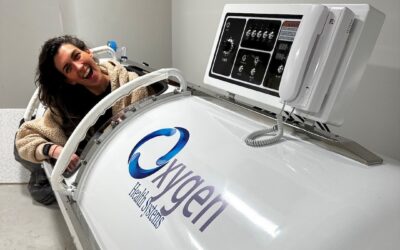October is Breast Cancer Awareness month, an annual effort to increase consciousness and knowledge on the prevention, screening, and treatment of breast cancer. Almost everyone knows someone who has been affected by breast cancer, and it’s estimated that 1 in 8 US women and 1% of men will develop breast cancer in their lifetime.
While it’s true that some cases of breast cancer are caused by things that we cannot change, such as genetics; the vast majority of cases are due to lifestyle factors-the way that we live. So, what can we do to lessen our or a loved one’s chance of developing breast cancer?
At OWM Integrative Wellness, we focus on breast cancer prevention by addressing inflammation and oxidative stress, both contributing factors in the development of chronic disease.
What is Integrative Medicine?
Integrative medicine is a multi-faceted approach to health and wellness that combines the top science from multiple medical fields, such as neurology and endocrinology. These traditional medical therapies are then combined with the natural disciplines of naturopathic and nutritional medicine to support the overall vitality of an individual. When it comes to cancer prevention, this medical approach allows the body to heal itself and restore essential functions.
The Integrative Approach to cancer prevention, specifically breast cancer, focuses on lifestyle factors of an individual that include: improving diet, increasing exercise, minimizing toxin exposure, decreasing stress levels, and improving sleep.
Focus on a Healthy Diet
Your dietary choices can have a significant impact on, not only breast cancer prevention but prevention of all cancer and disease. In other words, what you do and do not consume can play a key role in your overall risk of developing breast cancer. Some ways you can improve your diet and protect your health include:
DO
- Eat a well-balanced diet full of vegetables, fruits, healthy fats, and high-quality proteins to increase antioxidant activity and reduce inflammation.
- Eat a high-fiber diet. Fiber is critical for digestive and immune system health by aiding in proper detoxification.
- Include cruciferous vegetables in your diet. Vegetables like broccoli and cauliflower are sources of sulforaphane which have antioxidant and anti-cancer properties. These veggies also include properties that help with proper estrogen metabolism.
- Try a Fast Mimicking Diet. Scientific studies suggest that prolonged fasting may have cancer-fighting benefits. (However, always consult with your physician before beginning any calorie-restricted diet.)
AVOID
- Highly processed and fried foods can increase inflammation in the body.
- Sugar and refined carbohydrates. Diets high in highly processed carbohydrates are linked to the growth of cancer cells.
- Excess alcohol consumption. Studies show that moderate to high alcohol consumption is linked to a 30-50% increase in breast cancer risk.
Get Moving!
Exercise is essential for both our physical and mental health-both of which are important for all cancer prevention. If you are overweight or obese, your risk of developing breast cancer is greater than someone who is at a healthy weight. Regular exercise helps to control weight, strengthen the immune system and reduce your chance of developing the disease.
Try to aim for at least 3 hours of exercise a week including strength and cardio training. If this is difficult for you, even walking 30 minutes a day can help reduce your risk of breast cancer.
Minimize your Exposure to Hormone Disrupting Toxins
Toxins are everywhere in our environment, and reducing your toxic load is key to overall disease prevention. Xenoestrogens are known hormone-disrupting chemicals found in many everyday products such as personal care, fragrance, plastics, and many types of meat and dairy products. These chemicals bind to estrogen receptors in breast tissue and have a carcinogenic effect on the body.
Xenoestrogens also increase our risk of disease by weakening the immune system and putting strain on the liver, causing inflammation and damage. So, what are some ways to avoid or minimize exposure to these toxins?
- Always use paraben and phthalate-free cosmetics and personal care products.
- Choose grass-fed and organic meat, egg, and dairy products.
- Drink filtered water; avoid tap water.
- Avoid pesticides and purchase organic produce when possible. Or better yet, grow your own!
- Avoid plastics in the kitchen including water bottles, storage containers and bags, and some cookware.
For more information on hormone-disrupting chemicals and making better, more well-informed choices when it comes to everyday products you can access the Environmental Working Group’s website here.
Decrease Stress and Get Your ZZZZ’s
Last but not least, both stress levels and sleep can have an effect on our risk of developing cancer. Emotional stress can manifest into physical inflammation and illness. A major aspect of Integrative Medicine is looking at the whole person, including emotional health, in preventing and treating disease. Learning proper breathing techniques and practicing mindfulness helps to regulate the stress response and can prevent the replication of malignant cells.
Another way to reduce stress is to make sure you are getting an adequate amount of sleep every night. Proper sleep optimizes brain function, lowers oxidative stress, and reduces your chance of developing breast cancer. Try to go to bed at the same time every night and aim for at least 8 hours of uninterrupted sleep per night.
OWM and Cancer Prevention
When it comes to breast cancer and your health, an ounce of prevention is worth a pound of cure. Adopting a healthy lifestyle that puts focus on a healthy diet, reduces toxic overload, and includes plenty of exercise, sleep, and stress reduction can go a long way toward avoiding a future cancer diagnosis. For information on Integrative Medicine and its approach to both cancer prevention and treatment, visit us here.




